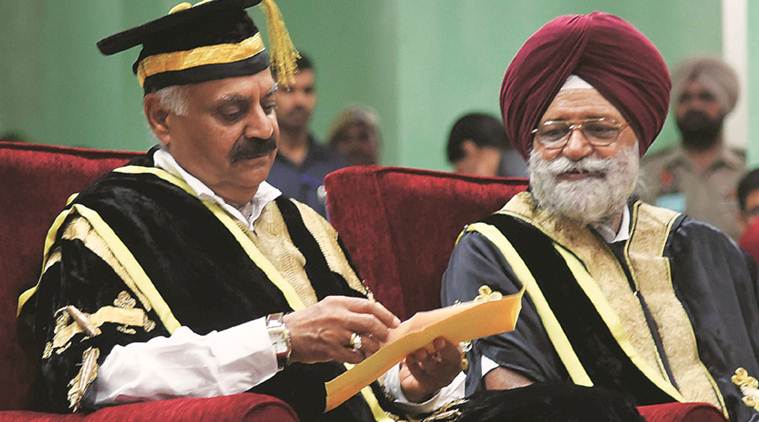 Governor V P Singh Badnore (left) with V-C B S Dhillon during the annual convocation at Punjab Agricultural University (PAU)in Ludhiana. Gurmeet Singh
Governor V P Singh Badnore (left) with V-C B S Dhillon during the annual convocation at Punjab Agricultural University (PAU)in Ludhiana. Gurmeet Singh
Six days after a journalism student handed a letter to Punjab Governor ‘questioning’ the decision to pardon to four policemen convicted in a 1993 fake encounter case, the Punjab Agricultural University (PAU) has issued a notice to the student asking him to explain his action during the convocation ceremony.
The university has asked Harsimran Singh Gill (29) to explain why action should not be initiated against him for misusing the stage and the occasion of convocation by handing over such a letter to the Governor.

Gill, while receiving his Masters in Journalism and Mass Communication (MJMC) degree during convocation at PAU on July 24, had handed over a letter to Punjab Governor V P Singh Badnore titled ‘To Wake Your Conscience’ in the presence of PAU V-C Dr B S Dhillon. The letter addressed to the Governor read that ‘Please awaken your conscience, you have ashamed the nation…’
Badnore, who is also ex-officio Chancellor of the varsity, was the chief guest at the convocation. He took the letter from Gill on stage during group photograph and was seen reading it later.
Dr Rajinder Singh Sidhu, Registrar, PAU, who has issued the notice, said: “Convocation is an occasion for students to receive degrees and not misuse stage for other purposes. There were other ways to contact or meet or communicate with the Governor if the student wanted to convey any grievances. The university stage is not meant for that. We have issued him a notice asking to explain why disciplinary action should not be initiated against him.” He added that “according to university rules, it was a case of gross indiscipline. The Governor is not only the constitutional head of the state, but also chancellor of university. He was the honourable chief guest that day. And a student cannot misuse an occasion like convocation to do such acts and insult a dignitary. It was a complete misuse of the platform to say the least. Sanctity of convocation stage was put at stake by the student with this act”.
Asked about the action that can be taken against Gill, he said: “The disciplinary committee will decide that once we receive a reply from the student.” Confirming that he had received a notice, Gill said, “This is how the institutions that teach us to speak and stand for the truth treat us when we actually do so. It is sad. I will reply to the notice in time.”
The subject line of letter that was given to the Governor by Gill said: ‘To Wake Your Conscience’. It read: “Respected sir, You are already aware of the pardoning granted to the police officers involved in the case of Harjit Singh. You have ashamed the designation, investigation agencies and the citizens as well as the nation by showing this act of yours. Sir, I request you to please awake your conscience so that the people of this nation could believe in the justice system of this country i.e. equal for each and every citizen of our India. Sir you have brought down the justice as well as the faith of citizens of India in the judiciary by your this act of pardoning 4 policemen who were guilty of fake encounter of Harjit Singh. We expect you to recall your orders…’
Story continues below this ad
The Indian Express was the first to report in a June 21 article that four policemen – then Uttar Pradesh Superintendent of Police Ravinder Kumar Singh, Inspector Brij Lal Verma and Constable Onkar Singh and then Punjab Police Inspector Harinder Singh — have been pardoned by the Governor. The four policemen were convicted for life by a special CBI court on December 1, 2014, for criminal conspiracy, abduction and murder of Harjit Singh, a resident of Saharan Majra village in Ludhiana district. It was a long wait for justice for the family as the conviction had come 21 years after Harjit was allegedly abducted on October 6, 1993, and was killed on the night of October 12,
1993, in an encounter by UP Police after the police accused him of being involved in a murder case which was subsequently proven false. The CBI too conducted a probe after the victim’s father, Mohinder Singh, approached the High Court. The CBI probe had found that cops murdered Harjit to get “out of turn promotions”.

 Governor V P Singh Badnore (left) with V-C B S Dhillon during the annual convocation at Punjab Agricultural University (PAU)in Ludhiana. Gurmeet Singh
Governor V P Singh Badnore (left) with V-C B S Dhillon during the annual convocation at Punjab Agricultural University (PAU)in Ludhiana. Gurmeet Singh






























